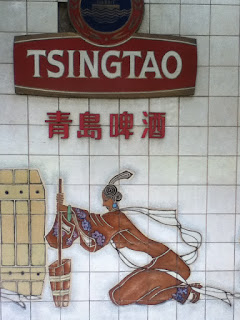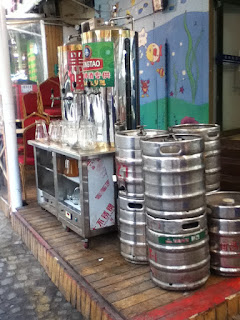Tea
is the second most drunken beverage in the world behind water, but I imagine
beer isn’t too far behind. It’s popular in China, ancient home of tea. And like
tea, beer seems to have found acceptance and favor in just about every place
its been introduced. I think we can thank those Germans for bringing the
process with them wherever they went.
They
brought it to my hometown in Minnesota where the castle-like Grain Belt Brewery
still stands on the banks of the Mississippi in Northeast Minneapolis. Though
now the brewery produces art and design. But that’s OK, there are plenty of
small, fine micro-breweries popping up in that hopping, but still neighborly,
sedate neighborhood where I was taken home to as a baby and where my
grandfather probably made a toast to me with some of the Grain Belt that was
part of his pay as a brewery worker many years ago.
The
Germans, like a few other western countries, got treaty concession rights to a
port area along the eastern coast of China as the twentieth century began.
China was in a bit of rough straits around that time, and so they had to make
some deals. The Germans got a few square miles of pretty, hilly seashore in a
place called Qing Dao. Yes it’s pronounced pretty dang close to Tsing Tao. My
Chinese bar owner friend who spent a few years living in Switzerland, just says
“Ching Dao” for “Ch” is the Chinese Pin Yin (Romanticized) pronunciation of “Q”
and “Tsing Tao” is just a variation on the city name.
Anyway,
all that etymology is to say, the beer was named after the city. On the label
is the picture of the pavilion that sits at the end of a pier jutting right out
from the old town. Qing Dao is a few hundred miles from where I’m living, so
there is plenty of Tsing Tao around. But as well, most cities have their own
beers named after the city as well—Yantai, Harbin, Beijing, and many others.
Well,
one of the first things the Germans did when they moved into Qing Dao was to
find a good spring and build a brewery over it. They don’t mess around. Like in
Minneapolis, they built a big old brewery because they know there going to want
to drink some beer. I suppose they figured out that once the locals get a taste
of their frothy malt beverage, they’d probably want some too.
That
old brewery lasted over 100 years, and just like the Minneapolis one, it’s
still standing. The Chinese recently upgraded the faculties, but the old one is
still there. Brewery tours are big business. There is whole street called Beer
Street around the brewery. Seafood restaurants line the road and shiny silver
kegs sit out front beckoning in visitors, as if 35-cent, fat, fresh oysters
weren’t enough to draw you in. Oh, you can get a bag-o-beer to go for a couple
of bucks from just about any restaurant, and there are hundreds of them.
Now
just about all the beer in China is lager beer and typically not too strong,
ranging in alcohol content from 2.8% to 4.8%. Besides the name of the beer,
that’s about all an English speaker can read on the label. That means you can
drink a lot of it, if you choose. Packaged, it’s predominantly sold in 750 ml
cans or bottles (bombers or tall boys!).
Now
that summer is here, every evening hundreds of tables and chairs are set up on
the plaza in front of the modern mall beside my apartment tower complex. Long,
rectangular electric grills barbeque up skewers of meat, vegetables and
seafood. And what else is there? kegs of beer of course. Pitchers and glasses
of beer sit on almost every white plastic table. Men and women sit—drinking,
eating, and enjoying the evening.
As
with many of my peers, I’ve come to like and drink the splendid American ales
that are being produced all across the country. But let me tell you, I sure
didn’t stop drinking beer once I arrived in China. Your parents drank lagers,
you’ve drunk lagers, and millions of people drink lagers. Beer is good. That’s
not to say that I’ve been reconverted. One of the first things I’ll be doing
when I get back to Minneapolis is buy a six-pack of Summit Ale.
China
is changing so fast, taking in English and the world, it probably won’t be long
before a few ales will be popping up. They are already. Yantai has one bar that
brews a wheat beer. In Shanghai there’s a brewpub or two and when I was in
southern China, in the mountain ex-pat town of Dali, a bar called the Funky
Monkey, a Minnesotan was supposed to brew up beer, and a local bluegrass band
would play many nights. I somehow missed out on that as I roamed the old stone
streets inside the city walls during Chinese New Year.
As
they say in China, “gambai!”










No comments:
Post a Comment